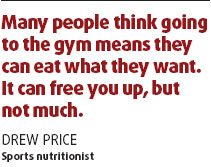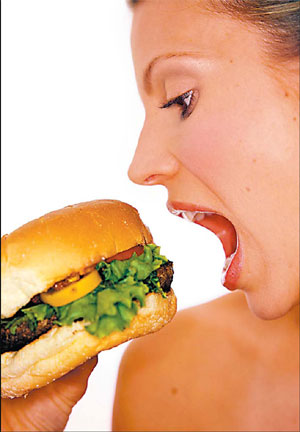Eat junk, feel rubbish
LONDON: Many of us believe that taking exercise gives us a license to eat fattening foods with no adverse effects. Surely is that the whole point of physical exertion? Not so, say the experts. Any effective exercise habit must be supported by the right food.
"It's like fuelling a car," says sports scientist Dr Garry Palmer. Bad nutrition, he says, can hinder performance, leaving you sluggish and nauseous and, eventually, making you ill.
"Many people think going to the gym means they can eat what they want. It can free you up, but not much," says sports nutritionist Drew Price. "It depends on how overweight you are."

Heidi Skolnik, a sports nutritionist who works with the New York Giants football team, says it is all about balancing the calories coming in with the calories going out.
"I often see people who can't understand why they're not losing weight, but when we look at their food intake, they're eating as if they're running a marathon, not half an hour a day. That might burn 300 calories, but that's one chocolate bar - not a lot of food. Generally, you need more calories only if you are training intensely for more than two hours every day," Skolnik says.
The standard advice is that, if you're exercising, your diet should consist of 60 percent carbohydrates and 10-12 percent protein. The rest should be fat. If you want to lose weight, eat more protein and reduce both your carb and fat intake.
"Proteins increase your metabolism and chew up calories faster," says Price. Another weight-shedding advice is to eat your carbs in the morning or immediately post-exercise, when they are less likely to turn to fat.
Skolnik says sipping a carb-based sports drink during an intense spinning class (lasting an hour or more) increases blood sugar levels and helps the body to burn more fat.
"Whatever your goals, the most important thing is to make sensible food choices," says Price. "That's good quality protein (lean meat, fish, tofu, soya mince, quorn, quinoa, low-fat cottage cheese or quark cheese), good fats (oily fish, walnuts, flax seeds or flax-seed oil) and good carbs (wholegrain rice, bread and pasta, sweet potatoes and oats)."
As we know, not all carbs were created equal. "Good carbs have a low glycaemic index - glucose is released slowly into the blood - and won't result in energy crashes," says Price.
|
Fatty foods may have adverse effects for gym-goers. Courtesy of Yuanjing |
Another piece of well-known, but often ignored, advice is to drink enough water. "One study showed that almost half of all gym-goers were dehydrated before they even started exercising," says Skolnik.
Tess Griersmith, sports dietician at the London Sports Medicine Centre, says that even mild dehydration can impair performance by 30 percent. Some studies advise that you drink just under 3 liters a day when exercising, including half a liter two hours before physical exertion.
The timing of meals is also a big factor. The general rule is to wait three to four hours after big meals and one and a half to two after smaller meals before exercising. This way you'll avoid feeling lethargic or nauseous.
Bear in mind, however, that everyone's needs are different, depending on your fitness regime and body composition. Serious number-crunchers can calculate their basal metabolic rate (BMR), the number of calories they would burn if they stayed in bed all day, and from there, work out their calorie needs based on activity levels (try an online BMR calculator such as bodybuilding.com/fun/issa64.htm).
Alternatively, keep a food diary, noting down everything you eat. It is hard to kid yourself when it is all there in black and white. Above all, says Price, see the bigger picture: "There are no bad foods, just bad times and quantities to eat them in."
(China Daily 09/19/2007 page19)















